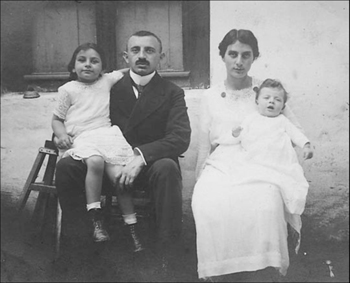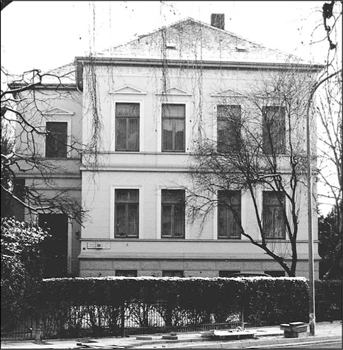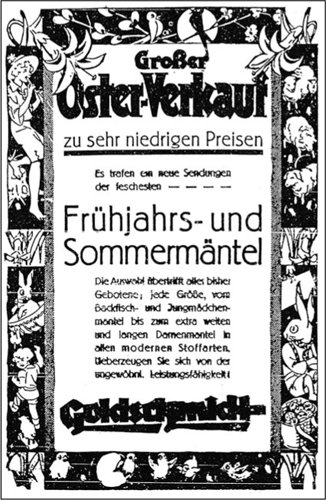Alex's Wake (7 page)
Authors: Martin Goldsmith
A month later, Moses died and Alex and Toni traveled to Sachsenhagen for the funeral. Alex returned home determined to acquire larger living quarters, a desire that only quickened after Toni gave birth to their first child, Bertha, in October 1909. In a little over a year, he made his move, purchasing the property at the corner of Schüttingstrasse and Achternstrasse that would house his
Haus der Mode
. Alex moved his family into the two floors above the store. There, on November 17, 1913, my father was born. He was named Günther Ludwig Goldschmidt, in honor of Toni's father.
Only three photographs of my grandfather have survived; the earliest one dates from this period in his life. Taken in the spring of 1914, shortly after Alex's thirty-fifth birthday and about six months after the birth of my father, the photo shows the young family posing in front of a window in an unknown interior. The beginnings of a smile seem to play around my grandmother's lips, my aunt's face is nearly beaming with a five-year-old's joy, and even my father looks moderately pleased with his circumstances. But Alex, in stiff high collar and proper suit, is solemn, serious, dignified; this sitting for the photographer represents to him a formal declaration of what he has achieved: his wife, his children, his hearth. I see pride in his face and in the set of his mouth and strong chin, a confidence that he will be able to meet and overcome whatever challenges life may send his way. He may need to shake an extra hand to make a sale or treat a city council member to a schnapps to get a favorable ruling on an expansion plan, but for Alex Goldschmidt every problem has a solution, if you think about it long and creatively enough and then take action.
Just a few months later, Alex joined the German army to participate in that hideous blunder known as the Great War. He fought for more than four years, first on the Belgian front and later in Russia. Miraculously, given the unspeakable carnage all around him, he was never
wounded. For his bravery, or perhaps just for surviving, he was awarded the Iron Cross, First Class. He returned to his home above the shop in January 1919, just days after his fortieth birthday. Toni had run the
Haus der Mode
in his absence and run it well. Their men might have been up to their knees in the mud of the trenches, but the women of Oldenburg had continued to shop for clothes and accessories during the war. With the resumption of peace, Alex decided to add a line of wedding furnishings to his offerings, and business really boomed. By the autumn of 1919, things were going so well financially that he felt comfortable acquiring one of Oldenburg's prime pieces of real estate. In October, he purchased from Friedrich Otto Graepel, a minister in the new republican government, a splendid house at 34 Gartenstrasse. It came equipped with a cook and a housekeeper. By any measure of material success, the Goldschmidt family had arrived.

The young Goldschmidt familyâAlex, Toni, Bertha, and Güntherâin 1914
.
The house was grand, a dream of well-crafted beauty and security. The main floor contained a large living room, a formal dining room, an expansive library, an enormous kitchen, exposed wooden beams
on the ceiling, and a cozy glassed-in veranda looking out to the green gardens in back. Upstairs were five bedrooms and a spacious bathroom with gleaming fixtures of polished nickel. Downstairs were the servants' quarters and a room kept pleasantly chilled for the bottles of wine that lay neatly in wooden racks. A gardener appeared once a week in spring and summer to care for the apple and peach trees, rosebushes, and rhododendrons, and to tend the spacious lawn. And there was a spot in the backyard given over to a strawberry patch, the special province of Alex himself. Tending it was a singular pleasure: preparing the bed in springtime, tending to the earth in the growing season, and gathering in the rich red berries at harvest time.

The magnificent house at 34 Gartenstrasse that Alex purchased in 1919, as seen from across the street
.
My father's chief domestic responsibility was a chicken house and run that extended along the north side of the house, a realm inhabited
by a rooster and a dozen hens that provided the family with fresh eggs every morning. But Günther's dearest memories from those happy days on Gartenstrasse stem from the many hours he spent playing with his sister Bertha and a family friend named Elsa Boschen. They would gather at the chicken run after school and then scurry the few hundred yards to the entrance of the glorious Schlossgarten. There they established an imaginary country called the
Anemonen Reich
, or “Anemone Kingdom.” The children took turns serving as the country's monarch, issuing decrees, ordering executions, granting pardons, and launching fierce wars against the enemies of the Anemones. But the kingdom had its pacific side as well, and Günther, Bertha, and Elsa spent many idle hours together in the park reading their storybooks or lying on their backs at the edge of the pond, looking up into the blue skies and wondering where the clouds came from and where they went.
Perhaps encouraged by their splendid and spacious new home, Alex and Toni decided to enlarge their family. A second daughter, Eva, was born in June 1920, and then fifteen months later, on September 14, 1921, came a second son, Klaus Helmut. Eva entered the world with a club foot and had to undergo surgery, a delicate operation that was performed at the university hospital in Göttingen, about 170 miles away. The operation was considered a success, but Eva continued to walk with a slight limp for the rest of her life. My father remembered his younger sister as a quiet and sensitive girl, “full of poetry and dreams.” Both Eva and Helmut began their schooling at home under Toni's tutelage, but after each turned ten, they entered Oldenburg's school system, Eva at a girls' academy, the Cecilia School, and Helmut at the prestigious Altes Gymnasium.
As the 1920s neared their end, Alex Goldschmidt's fortunes continued to grow. The economic shocks of the early â20s, many stemming from the severe financial penalties imposed upon Germany as part of the Treaty of Versailles, gave way to a sustained recovery. After years of deprivation, the women of Oldenburg were once again able to indulge their desire for attractive clothing, and the
Haus der Mode
was eager to assist them. Business was so good that in 1927, Alex unveiled the first outdoor neon sign ever seen in the narrow winding streets of downtown
Oldenburg. It read: “Alex Goldschmidt
Spezialhaus für Damenkonfektion und Kleiderstoffe
,” or “Specialty House for Women's Ready-to-Wear and Dress Material.” The
Haus der Mode
had become a retail landmark, like Macy's or Starbucks. C. A. Will, who ran a shoe store, put an advertisement in the newspaper identifying his store's location as 47 Achternstrasse and added, as a helpful hint, that it was right next door to Goldschmidt's.

The prosperous Goldschmidt and Behrens clans gather for the sixtieth birthday of my great grandmother Jeanette Behrens on March 24, 1923. Grandfather Alex, resplendent in evening wear, stands at the top left. My grandmother Toni stands four persons to his left; Jeanette sits at the center of the photo; and my father Günther, aged nine, sits to her immediate right
.
At the end of the decade, either by design or by happenstance, Alex entered into negotiations with Oldenburg's city council to alter the dimensions of his store just as the city's chief engineer began to advise the council of the need to widen Achternstrasse at the corner of Schüttingstrasse. In early February 1930, the Oldenburg
Nachrichten
published the minutes of a discussion held during the council's most recent meeting.
The topic was the Goldschmidt company's building plans and a related proposal for the relief of traffic congestion in the inner city. The council debated a recommendation that “the merchant Goldschmidt shall cede about twenty-one square meters of his property in order to widen the Achternstrasse” and that “the merchant Goldschmidt shall receive compensation amounting to twelve thousand Reichmarks [RM] and a mortgage of twenty thousand Reichmarks at 8½% interest.” The properties at 48 Achternstrasse and 34 Gartenstrasse would be held as collateral for the mortgage.
One member of the council complained that the figure of 12,000 RM was too generous. Another member agreed and proposed reopening negotiations with Herr Goldschmidt. At that point, the mayor rose and declared that several planning sessions had already taken place and that Herr Goldschmidt had acceded several times to the city's requests. Furthermore, said the mayor, building materials are expensive, the 12,000 RM figure had been painfully arrived at, and he was convinced that Herr Goldschmidt would not profit from the exchange. The city engineer testified that widening Achternstrasse was critical to the effort of easing downtown traffic, and two other council members declared their support for the recommendation, agreeing that traffic congestion had become an urgent matter. With that, the council voted, and the recommendation passed.
Indeed, Alex's planning was already under way. A month earlier, he had taken out an ad in the
Nachrichten
announcing a clearance sale. Suits, dresses, skirts, blouses, silks and other fabrics, decorative artsâall would be emptied from the
Haus der Mode
to make room for an exciting new venture. On February 22, following the approval of the city council's resolution, Alex placed another ad, announcing that soon the Goldschmidt name would be associated exclusively with the purveyance of fine coats. Meanwhile, the special clearance sale would continue with everything sold at rock-bottom prices! During remodeling, the
Haus der Mode
would remain open, although the main entryway would now be “a private entrance” on Schüttingstrasse, the doorway to the family's former apartment above the store. Hurry . . . everything must go!

The Easter-themed advertisement for Alex's House of Coats that ran in the Oldenburg
Nachrichten
on April 14, 1930
.